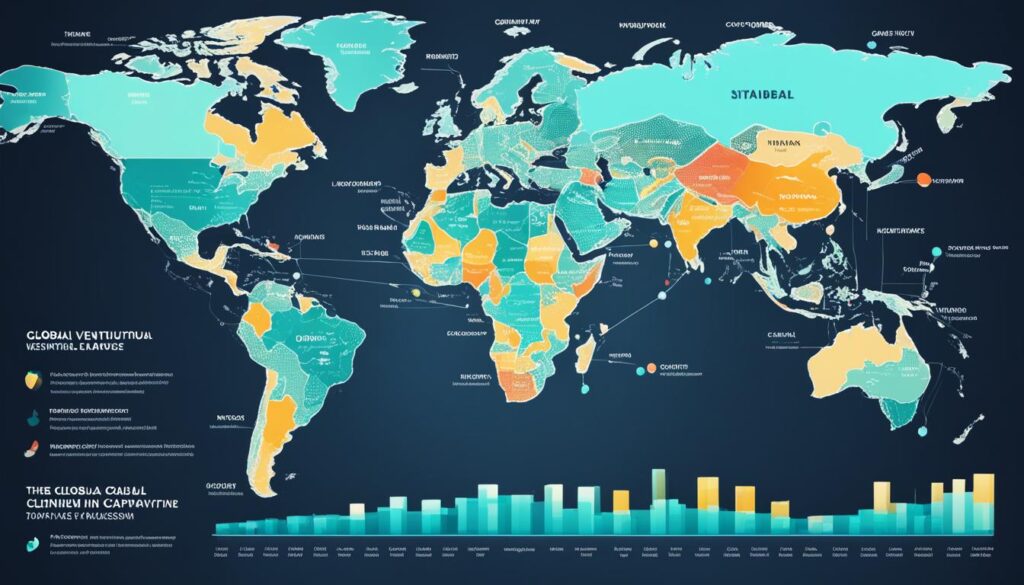As the global economy continues to evolve, the quest for the optimal destination for venture capital investment has become a topic of increasing interest. With the United States emerging as a leading hub for startups and innovation, the question arises: Which country truly offers the most compelling ecosystem for venture capitalists seeking high-growth opportunities?
The United States has solidified its position as a powerhouse in the venture capital landscape, attracting over $211 billion in investment in 2023 alone. This robust performance is underpinned by the country’s mature venture capital ecosystem, which boasts a long history of successful investments and exits. The U.S. is a global leader in innovation and technology, with a high concentration of tech startups and tech giants, particularly in hubs like Silicon Valley. This vibrant ecosystem fosters a culture of entrepreneurship and creativity, attracting both domestic and international venture capitalists.
Alongside its thriving startup community, the United States offers a favorable regulatory environment that provides robust protections for intellectual property – a critical factor for early-stage companies. Additionally, the sheer size of the domestic market presents a significant advantage, as startups can leverage the vast consumer base to drive growth and scale their operations.
Key Takeaways
- The United States is the leading destination for venture capital investment, attracting over $211 billion in 2023.
- The U.S. boasts a mature venture capital ecosystem, a long history of successful investments and exits, and a global leadership in innovation and technology.
- The country’s favorable regulatory environment, with strong intellectual property protections, is a key draw for venture capitalists.
- The United States offers a vast domestic market, providing startups with ample opportunities for growth and scaling.
- The concentration of tech startups and tech giants in hubs like Silicon Valley creates a dynamic and entrepreneurial culture.
Top Venture Capital Destinations Globally
While the United States dominates the global venture capital landscape, attracting over $211 billion in investment in 2023, other countries have also emerged as major destinations for venture capital. The top venture capital hubs outside the US showcase diverse strengths that appeal to startup founders and investors seeking new growth opportunities.
United Kingdom Ranks Second with Strong Ecosystem
The United Kingdom ranks second in venture capital, attracting roughly $32 billion in 2023. The UK benefits from its legacy as a global financial center, providing robust infrastructure for venture capital activities. The country is home to thriving tech hubs like London, Cambridge, and Manchester, which have thriving startup ecosystems supported by a skilled talent pool and a culture of innovation.
China’s Massive Market Fuels VC Growth
China has also become a strong venture capital hub, with the country’s massive domestic market, active government support for entrepreneurship and innovation, and rapid economic growth propelling the startup ecosystem forward. In 2023, China attracted nearly $17 billion in venture capital investment across sectors like automotive, AI, and green technology, demonstrating its growing appeal as a premier destination for startup funding.
| Country | Venture Capital Investment (2023) | Key Strengths |
|---|---|---|
| United States | $211 billion | Mature venture capital ecosystem, robust innovation hubs, favorable regulatory environment |
| United Kingdom | $32 billion | Global financial center, thriving tech hubs, skilled talent pool |
| China | $17 billion | Massive domestic market, government support for entrepreneurship, rapid economic growth |

Factors Driving Venture Capital Success
Several key factors contribute to a country’s ability to attract venture capital investment. At the forefront are robust startup ecosystems and the presence of thriving innovation hubs. These provide a fertile ground for new businesses to take root and flourish, offering venture capitalists a wide range of promising investment opportunities.
In addition, access to a skilled workforce and deep talent pool, particularly in fields like technology and engineering, is a major draw for venture capitalists. Countries that can cultivate and retain top talent tend to be more successful in securing venture funding.
Furthermore, favorable regulatory environments and supportive government policies, such as tax incentives, funding programs, and strong intellectual property protections, can significantly enhance a country’s appeal for venture investment. Countries that have struck the right balance, like the United States, the United Kingdom, and China, have established themselves as premier destinations for venture capital.

By combining these key factors, leading countries have created dynamic and attractive environments for entrepreneurs and venture capitalists alike. As the global competition for venture funding intensifies, the ability to cultivate these elements will be crucial in determining a nation’s success in the venture capital landscape.
Which country is best for venture capital?
Among the leading countries for venture capital investment, the United States stands out as the clear global leader. The U.S. boasts a mature venture capital ecosystem, a long history of successful investments and exits, and a thriving culture of innovation and entrepreneurship, particularly in tech hubs like Silicon Valley. With over $211 billion in venture capital invested in 2023, the U.S. is the top country for venture capital funding.
United States Dominates with Mature VC Landscape
The United States’ venture capital landscape is unparalleled, offering a robust ecosystem, skilled talent pool, and favorable regulatory environment for startups. The U.S. legal system provides robust protections for intellectual property, which is critical for early-stage companies. Additionally, the vast domestic market for new products and services can be a significant advantage for startups looking to scale rapidly.
Singapore and Israel Punch Above Their Weight
While the U.S. dominates in total venture capital investment, some smaller nations have also emerged as attractive destinations for startup funding. Singapore and Israel, for instance, punch above their weight, attracting significant per capita venture investment due to factors like favorable business environments, skilled talent pools, and government support for innovation. These countries have cultivated thriving startup ecosystems, making them compelling options for venture capitalists seeking high-growth opportunities.

European Powerhouses in Venture Capital
Europe has also emerged as a major player in the global venture capital landscape, with several countries establishing themselves as regional powerhouses. The
United Kingdom: A Global Financial Center
, a global financial center, attracted roughly $32 billion in venture capital in 2023, benefiting from its robust infrastructure for financial activities and thriving tech hubs.
Across the Channel,
France: Innovative Sectors and Government Initiatives
has seen significant venture investment, bolstered by government initiatives like the French Tech program. France’s focus on innovation in sectors like biotech, AI, and cleantech has drawn the attention of European venture capitalists.
Meanwhile,
Germany: Economic Strength and Startup Hubs
, the largest economy in Europe, has also become a venture capital hub, driven by its economic strength, technical talent, and startup ecosystems in cities like Berlin, Munich, and Frankfurt.

| Country | Venture Capital Investment (2023) | Key Sectors |
|---|---|---|
| United Kingdom | $32 billion | Fintech, AI, Cybersecurity |
| France | $18 billion | Biotech, Cleantech, AI |
| Germany | $22 billion | Enterprise Software, Mobility, Industrials |
Emerging Venture Capital Markets
While the traditional venture capital powerhouses continue to dominate the global landscape, some emerging markets are also gaining traction as attractive destinations for startup investment. One such market that has become a hotspot for venture capital is India, with its vast consumer market and rapidly growing tech talent pool.
India’s Vast Consumer Market and Tech Talent Pool
India, with its large population, increasing urbanization, and rising income levels, presents a significant opportunity for startups looking to scale quickly. The country has attracted nearly $17 billion in venture capital investment in 2023, as investors recognize the potential of its vast consumer market. Additionally, India’s strong focus on technological innovation and digitalization has made it a magnet for venture capitalists seeking high-growth investment opportunities.
The country’s tech talent pool is another key factor driving venture capital interest. India has long been renowned for its skilled engineers, software developers, and other technical professionals, making it an attractive destination for startups and investors alike. This abundance of tech talent, combined with the country’s rapidly growing consumer base, has positioned India as a premier emerging venture capital market.

Regional Hotspots for Venture Investment
Beyond the global leaders, certain regions have also emerged as attractive venture capital hubs. These regional hotspots offer unique advantages that appeal to startups and venture capitalists alike, showcasing the diversity of the venture capital landscape.
Canada’s Stable Economy and Government Incentives
Canada, with its stable economy, robust banking system, and a range of government incentives for startups and investors, has attracted over $10 billion in venture capital in 2023. The country’s business-friendly policies, skilled talent pool, and thriving innovation ecosystems, particularly in tech hubs like Toronto and Vancouver, have made it an increasingly attractive destination for regional venture capital investment.
South Korea’s Tech Prowess and Corporate Investment
South Korea, known for its advanced technological infrastructure and strong government support for innovation, has also seen significant venture investment, particularly in sectors like fashion and fintech. The country’s tech prowess, combined with active corporate investment in startups, has helped drive venture capital activity in this dynamic regional hub.
Israel’s Global Outlook and Startup-Friendly Policies
Israel, renowned for its success in areas like cybersecurity, agritech, and biotech, has cultivated a startup-friendly environment through initiatives like the Israel Innovation Authority. This global outlook and supportive policy landscape have enabled Israel to draw $6 billion in venture capital in 2023, cementing its position as a leading regional venture capital hub.

Per Capita Venture Capital Investment
When looking at venture capital investment on a per capita basis, the picture shifts. While the United States dominates in overall venture capital, smaller nations like Singapore and Israel punch above their weight, attracting significantly higher levels of per capita venture capital investment. This highlights how these smaller nations have been able to foster thriving startup ecosystems and provide attractive environments for venture capitalists, despite their relatively small populations.
In contrast, some of the world’s most populous countries, such as India and China, lag behind in per capita venture investment, indicating that while they have large startup investment economies, the funding is not yet reaching a significant portion of their vast populations.
| Country | Per Capita Venture Capital Investment |
|---|---|
| Singapore | $5,638 |
| Israel | $4,925 |
| United States | $640 |
| India | $12 |
| China | $12 |
The data highlights the stark contrast between the per capita venture capital investment levels in smaller nations and more populous countries. While size and population are not the sole determinants of a country’s venture capital attractiveness, this analysis underscores the importance of creating an environment that fosters entrepreneurship and innovation, regardless of a nation’s overall size.
Industry Trends and Key Sectors
The venture capital industry is largely driven by technological innovation and emerging industries that hold promise for high growth and attractive returns. The
technology sector
, encompassing areas like software, fintech, and AI, has consistently been a major focus for venture capitalists, attracting significant funding across the globe.
indicate that in 2023, close to $315 billion in venture capital was invested in tech companies worldwide.
Technology and Innovation Drive VC Interest
The technology sector’s dominance in venture capital investment is a testament to the rapid pace of innovation and the transformative potential of new technologies. Venture capitalists are eager to back startups that are developing cutting-edge solutions, from advanced software and fintech applications to groundbreaking AI and machine learning algorithms. Countries that excel in fostering technological innovation, such as the United States, China, and the United Kingdom, have become magnets for venture capital seeking to capitalize on these high-growth opportunities.
Emerging Sectors Like Biotech and Cleantech Gain Traction
While the technology sector continues to garner a significant share of venture capital, newer and more specialized industries are also gaining traction. The
biotech
and
cleantech
sectors, for instance, have seen increased venture investment as investors seek out novel solutions to pressing global challenges. Advancements in fields like genomics, renewable energy, and sustainable mobility have drawn the attention of venture capitalists, recognizing the immense potential for disruptive innovation and high-impact solutions. Countries like Israel, France, and Germany, which have established themselves as leaders in these emerging sectors, have become increasingly attractive destinations for venture capital.

Challenges and Considerations
As the global venture capital landscape continues to evolve, countries and startups alike face a range of challenges and considerations that shape the investment landscape. Chief among these is the fierce competition for top talent, particularly in technical fields. Countries and companies are vying to attract and retain the skilled workforce needed to drive innovation and growth, creating a talent war that can significantly impact a startup’s ability to thrive.
Competition for Talent and Resources
The talent competition is especially intense in emerging technology hubs, where the demand for engineers, data scientists, and other highly skilled professionals far outpaces the supply. This can make it challenging for startups, particularly those without the resources of larger, VC-backed venture capital-backed companies, to recruit and retain the talent they need to succeed.
Regulatory and Political Landscape
In addition to talent challenges, the regulatory and political landscape also plays a critical role in a country’s attractiveness for venture capital investment. Startups and investors alike are closely attuned to the policy environment, seeking countries with favorable regulations, stable governments, and a commitment to supporting innovation. Navigating the complex web of rules and regulations can be a significant hurdle for entrepreneurs, making it essential for countries to provide a clear, predictable, and startup-friendly regulatory framework.
Global Economic Conditions and Market Volatility
Finally, broader global economic conditions and market volatility can significantly impact the flow of venture capital, as investors become more cautious during times of economic uncertainty. Fluctuations in interest rates, currency exchange, and overall market sentiment can all influence the willingness of venture capitalists to deploy their capital, making it crucial for countries to maintain a stable and resilient economic environment.
Countries that are able to effectively navigate these venture capital challenges, from talent competition and regulatory landscape to economic conditions and market volatility, are more likely to emerge as leading hubs for startup investment and innovation. By fostering supportive ecosystems and addressing these critical considerations, nations can position themselves as premier destinations for venture capital and drive the growth of their entrepreneurial ecosystems.

Conclusion
The global venture capital landscape continues to evolve, with certain countries emerging as dominant hubs for startup investment. The United States, with its mature VC ecosystem, robust innovation ecosystem, and favorable regulatory environment, remains the clear leader, attracting the highest levels of venture capital. However, other countries, both established and emerging, are also gaining ground, offering their own unique advantages to startups and venture capitalists.
Factors like skilled talent pools, government support, and thriving industry sectors have propelled countries like the United Kingdom, China, and India to prominence in the venture capital arena. As the global economy and technology landscape continue to shift, the competition for venture capital will likely intensify, with countries continuously working to refine their startup ecosystems and attract the most promising entrepreneurial talent and investment.
The venture capital landscape is a dynamic and constantly evolving field, reflecting the changing dynamics of innovation, government policies, and economic growth around the world. By understanding the key factors that contribute to a country’s success in attracting venture capital, entrepreneurs and investors can make more informed decisions and capitalize on the most promising opportunities in the global startup ecosystem.
